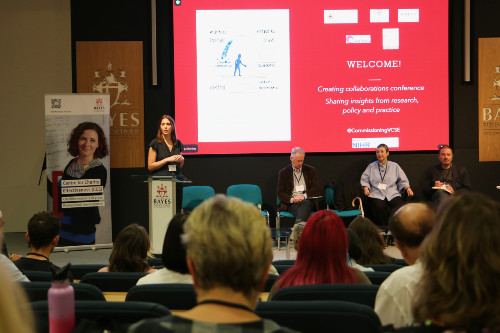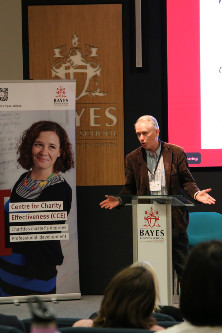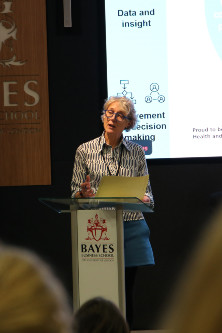Creating collaborations: sharing learning to strengthen VCSE and health and care commissioning
One-day event also marked the launch of the findings from a three-year NIHR-funded study into VCSE and health and care commissioning relationships
Practitioners, researchers and commissioners came to Bayes Business School (formerly Cass) at the end of October for an event hosted by the Centre for Charity Effectiveness (CCE) that sought to strengthen collaborative relationships between voluntary, community and social enterprises (VCSE) and health and care commissioners through the sharing of insights and learning from research, policy and practice.
Organised in partnership with NHS England, National Voices, NAVCA, the University of Birmingham, and the University of Plymouth, the one-day event also marked the launch of the findings from a three-year National Institute for Health and Care Research (NIHR)-funded study into VCSE and health and care commissioning relationships, and it featured a variety of different talks from people across the health and care landscape.
Evaluating relationships
After welcoming everyone to the event, Dr Angela Ellis Paine, Lecturer in Voluntary Sector Management at Bayes and lead organiser of the event, spoke about the NIHR-funded project, which was led by the University of Plymouth in partnership with the University of Birmingham and London School of Hygiene and Tropical Medicine (LSHTM).
The research investigated the vital relationship between health and care commissioners and VCSEs, and how they can collaborate better. Dr Ellis Paine, who initially started working on the project while at the University of Birmingham before moving to Bayes, said that commissioning had come to dominate relationships between health and care statutory and voluntary sector organisations, and was often seen as challenging, but with the potential to do things differently.
 Dr Angela Ellis Paine (left) welcomes attendees to the event
Dr Angela Ellis Paine (left) welcomes attendees to the event
“One of the key things we heard throughout the research was a desire to do things differently, to think about how we can work more collaboratively together. People also told us that commissioning often feels transactional and driven by procurement and contracting processes. But what we were also told is that what really matters to commissioning is relationships,” added Dr Ellis Paine.
The full research findings can be seen here.
Policy and practice insights
Following introductions by Dr Ellis Paine and the study’s Principal Investigator, Professor Rod Sheaff, a number of different speakers addressed various insights from VCSE and health and care commissioning policy, practice and research.
During the session entitled ‘What’s the expectation? Insights from policy’, Professor Pauline Allen, Professor of Health Services Organisation at LSHTM, spoke about the architecture of the NHS and social care system in 2023. She expanded on the new Integrated Care Boards (ICBs), which replaced clinical commissioning groups (CCGs) in the NHS in England on 1 July 2022, saying how it’s still early days in terms of how they will turn out.
 Professor Rod Sheaff speaking at the Creating Collaborations conference
Professor Rod Sheaff speaking at the Creating Collaborations conference
Alex Baylis from The King’s Fund then spoke about health and care policy and VCSE. He discussed the need for bottom-up learning, as well as the barriers and enablers that exist, including a lack of understanding and rigid processes, as well as a history of not recognising full VCSE costs.
In the next session, entitled ‘What’s the experience? Insights from practice’, Jo Baker from NHS West Yorkshire Integrated Care Board, Pip Goff from Forum Central, and Nick Grudgings from the Leeds Office of the NHS West Yorkshire Integrated Care Board, spoke about the ICB in Leeds and looking after the 2.6 million people in the broader area. In particular, they focused on how to integrate across the system and manage outcomes and costs; the role of ICBs in enabling the third sector; and also investing in opportunities for relationships.
Workshopping various ideas
After the morning sessions, participants split up and attended one of three workshops which explored the evidence and recent insights from research.
The first workshop, which was titled ‘From commodified to collaborative?’, looked at how and why VCSE and health and care commissioning relationships vary. It was led by Dr Ellis Paine and Professor Mark Exworthy, Professor of Health Policy and Management at the University of Birmingham. Also contributing to the workshop was David Fannin, CEO from Lincolnshire CVS.
Titled ‘Community-led social prescribing: Creating a working definition’, the second workshop was led by Dr Ellie Munro from Sheffield Hallam University and Dr Olivia Engle from the National Academy of Social Prescribing.
Finally, the third workshop was titled ‘Mobilising community assets to tackle health inequalities: A blueprint for change’, and it was led by Professor Angela Harden, Professor of Health Sciences in the School of Health and Psychological Sciences at City, University of London, and Dr Katie Rose Sanfilippo, Presidential Research Fellow in SHPS at City.
 Pip Goff from Forum Central
Pip Goff from Forum Central
What’s next?
The final session, ‘So, what’s next? From insights to actions’, featured Alex Boys from NAVCA, Jacob Lant from National Voices, Carrie McKenzie from NHS England, and Feodora Rayner from NHS England.
Carrie and Feodora provided the NHS England perspective, and Feodora spoke specifically about the Provider Selection Regime (PSR), and the regulations and legislative changes (which come into place on 1 Jan 2024 for England) used for services arranged by the NHS. Brought in under the Health and Care Act 2022, PSR brings two procurement regimes into one.
In addition, Carrie also spoke about the need for a greater understanding of VCSE and its role within health and care. Jacob and Alex also spoke about the various issues, with the former highlighting the challenge of engaging with ICBs, as while the system wants to move to a more collaborative way of working, it will take time.
Sharing knowledge
Speaking about the event, Dr Ellis Paine said that she hoped the event was a continuation of the NIHR research, which has worked to bring together commissioners and VCSEs in more neutral spaces.
“The event was a chance to share the knowledge, the insights, the perspectives, the experiences that our participants have and it was great to see people sharing that wisdom that already exists. Hopefully, the attendees will take away the insights shared from policy, practice and research, and spread them more widely.”
